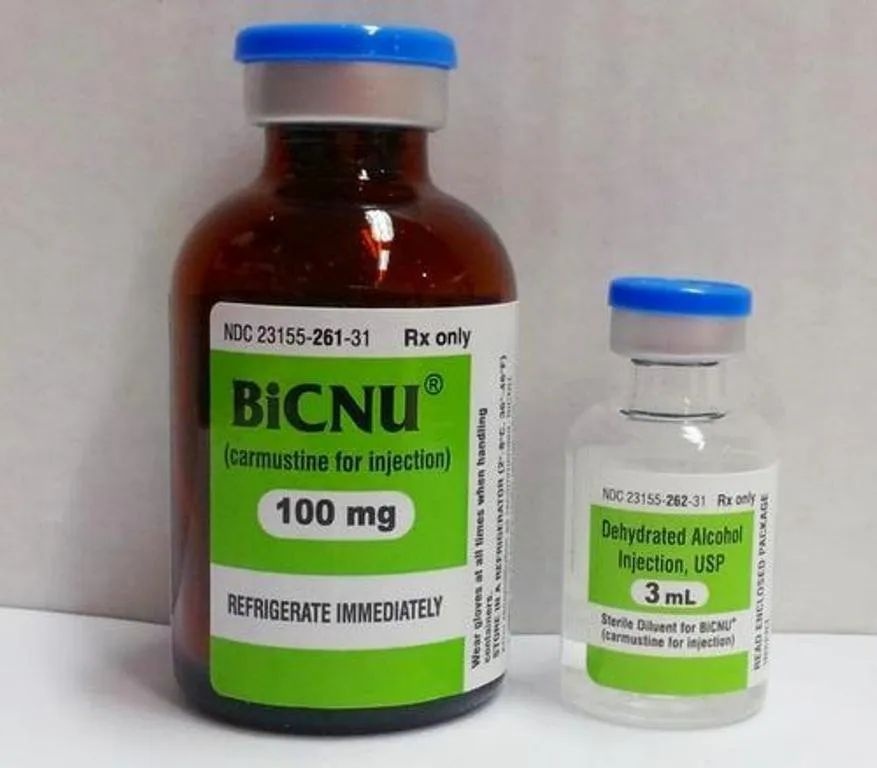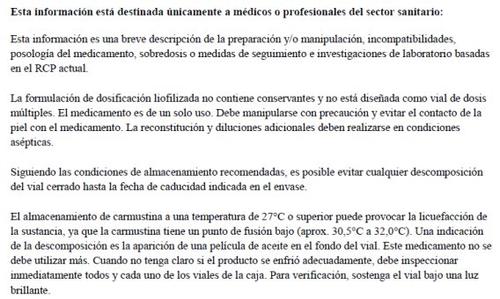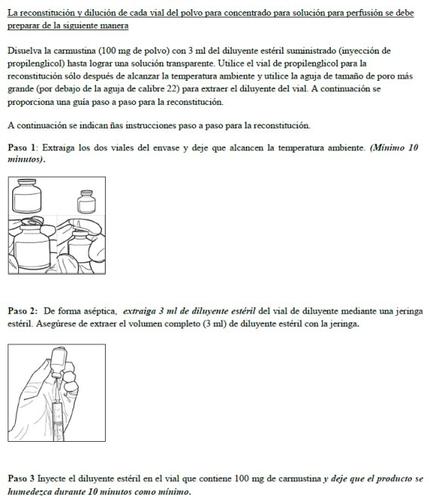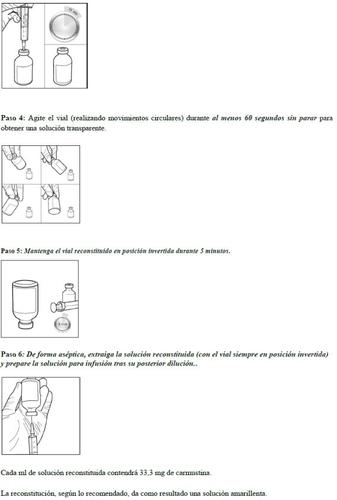

BICNU 100 mg PÓ E SOLVENTE PARA SOLUÇÃO PARA PERFUSÃO


Como usar BICNU 100 mg PÓ E SOLVENTE PARA SOLUÇÃO PARA PERFUSÃO
Introdução
Prospecto: informação para o utilizador
BiCNU 100 mg Pó e dissolvente para solução para perfusão EFG
Carmustina
Leia todo o prospecto detenidamente antes de começar a usar este medicamento, porque contém informações importantes para si.
- Conserva este prospecto, porque pode ter que voltar a lê-lo.
- Se tiver alguma dúvida, consulte o seu médico, farmacêutico ou enfermeiro.
- Este medicamento foi-lhe prescrito apenas para si, e não deve dá-lo a outras pessoas, mesmo que tenham os mesmos sintomas que si, porque pode prejudicá-las.
- Se experimentar efeitos adversos, consulte o seu médico ou enfermeiro, mesmo que se trate de efeitos adversos que não aparecem neste prospecto. Ver secção 4.
Conteúdo do prospecto:
- O que é Bicnu e para que é utilizado
- O que necessita de saber antes de começar a usar Bicnu
- Como usar Bicnu
- Possíveis efeitos adversos
- Conservação de Bicnu
- Conteúdo do envase e informação adicional
1. O que é Bicnu e para que é utilizado
Bicnu é um medicamento que contém carmustina. A carmustina pertence ao grupo de substâncias anticancerígenas conhecidas como nitrosoureias, que actuam retardando o crescimento das células cancerígenas.
Bicnu é utilizado como terapia paliativa (aliviando e prevenindo o sofrimento dos pacientes) como agente único ou em terapia de combinação estabelecida com outras substâncias anticancerígenas aprovadas em certos tipos de cancro, como:
- Tumores cerebrais - glioblastoma, meduloblastoma, astrocitoma e tumores cerebrais metastáticos
- Mieloma múltiplo (tumor maligno em desenvolvimento desde a medula óssea)
- Doença de Hodgkin (tumor linfóide)
- Linforoma não-Hodgkin (tumor linfóide)
A carmustina também é utilizada como tratamento de acondicionamento prévio ao transplante autólogo de células-mãe (um procedimento no qual uma pessoa recebe células-mãe hematopoiéticas, que produzem qualquer tipo de célula sanguínea) em distúrbios hematológicos malignos do sistema linfático, como o linfoma de Hodgkin e o linfoma não-Hodgkin
2. O que necessita de saber antes de começar a tomar Bicnu
Não use Bicnu
- se é alérgico à carmustina, a outras nitrosoureias ou a qualquer outro ingrediente deste medicamento (listados na secção 6);
-Bicnu não deve ser administrado a pacientes que tenham um número reduzido de plaquetas (trombócitos), de glóbulos brancos (leucócitos) ou de glóbulos vermelhos (eritrócitos), tanto se é consequência da quimioterapia como se é por outras causas;
-se padece insuficiência renal grave;
-em crianças e adolescentes;
-se está grávida ou em período de amamentação.
Advertências e precauções
Consulte com o seu médico, farmacêutico ou enfermeiro antes de começar a usar Bicnu.
Como a maior toxicidade deste medicamento é a supressão tardia da medula óssea, o seu médico controlará o seu recuento sanguíneo pelo menos durante as 6 semanas seguintes à administração da dose. À dose recomendada, os ciclos de Bicnu não serão administrados com uma frequência maior a 6 semanas. A dose será confirmada com o recuento sanguíneo.
Antes do tratamento, será verificada tanto a função hepática como a renal e ambas serão vigiladas regularmente durante o tratamento.
Devido ao facto de o uso de Bicnu poder causar danos pulmonares, serão realizadas radiografias da região pectoral e testes da função pulmonar (por favor, veja a secção “Possíveis efeitos adversos”)
O tratamento com altas doses de carmustina (até 600 mg/m2) só é realizado em combinação com o posterior transplante de células-mãe. Estas doses altas podem aumentar a frequência ou a gravidade de toxicidades pulmonares, renais, hepáticas, cardíacas e gastrointestinais, bem como de infecções e alterações no equilíbrio electrolítico (baixos níveis em sangue de potássio, magnésio e fosfato).
A dor abdominal (enterocolite neutropénica) pode ocorrer como um acontecimento adverso relacionado com a terapia com agentes quimioterapêuticos.
Os pacientes que padecem múltiplas afecções simultaneamente e têm um estado de doença mais precário têm um maior risco de sofrer efeitos adversos. Isto é especialmente importante para os pacientes de idade avançada.
O seu médico aconselhá-lo-á sobre a possibilidade de dano pulmonar que pode aparecer devido ao uso de Bicnu e sobre as reações alérgicas e seus sintomas. Se ditos sintomas aparecerem, deve consultar o seu médico (veja secção 4)
Uso de Bicnu com outros medicamentos
Informa o seu médico ou farmacêutico se está a tomar, tomou recentemente ou poderá ter que tomar outros medicamentos, incluindo medicamentos sem receita médica, como:
- Fenitoína, utilizado para a epilepsia
- Cimetidina, utilizado para problemas estomacais como a indigestão
- Digoxina, utilizado se tem um ritmo cardíaco anormal
- Melfalán, fármaco anticancerígeno
Gravidez, amamentação e fertilidade
Se está grávida ou em período de amamentação, acredita que possa estar grávida ou tem intenção de engravidar, consulte o seu médico ou farmacêutico antes de utilizar este medicamento.
Gravidez e fertilidade
Bicnu não deve ser utilizado durante a gravidez, pois pode danificar o feto. Por conseguinte, Bicnu não deve ser administrado normalmente em mulheres grávidas. Se for administrado durante a gravidez, a paciente deve estar informada sobre o risco potencial para o feto. Aconselha-se às mulheres em idade fértil que evitem engravidar.
Os pacientes masculinos devem utilizar medidas anticonceptivas adequadas durante o tratamento com Bicnu durante pelo menos 6 meses.
Amamentação
Não deve amamentar enquanto estiver a tomar este medicamento.
Condução e uso de máquinas
Desconhece-se o efeito deste medicamento sobre a condução e o uso de maquinaria. Deve consultar com o seu médico antes de conduzir ou utilizar qualquer ferramenta ou maquinaria, porque a quantidade de álcool deste medicamento pode diminuir a sua capacidade para conduzir ou utilizar maquinaria.
Bicnu contém propilenglicol
O propilenglicol deste medicamento pode ter os mesmos efeitos que o consumo de álcool e aumentar a probabilidade de efeitos secundários.
Não use este medicamento em crianças menores de 5 anos.
Use este medicamento apenas se for recomendado por um médico. O seu médico pode realizar controles adicionais enquanto estiver a tomar este medicamento
3. Como usar Bicnu
Bicnu será sempre administrado por profissionais de saúde com experiência no uso de agentes anticancerígenos.
Este medicamento é administrado por via intravenosa.
Adultos
A dose depende da sua condição médica, do tamanho do seu corpo e da resposta ao tratamento. Normalmente é administrada pelo menos cada 6 semanas. A dose recomendada de Bicnu como agente único em pacientes que não foram tratados anteriormente é de 150 a 200 mg/m2 por via intravenosa cada 6 semanas. Isto pode ser administrado como uma única dose ou dividido em duas injeções diárias de 75 a 100 mg/m2 em dois dias consecutivos. A dose também dependerá de se Bicnu é administrado com outros fármacos anticancerígenos.
As doses serão ajustadas dependendo de como responde ao tratamento.
A dose recomendada de carmustina administrada em combinação com outros agentes quimioterapêuticos antes de um transplante de células progenitoras hematopoiéticas é de 300- 600 mg/m2 por via intravenosa.
O seu recuento sanguíneo será controlado com frequência para evitar a toxicidade na medula óssea e ajustar a dose se necessário.
Método de administração
A administração intravenosa deve ser realizada mediante perfusão.
Bicnu é administrado na veia mediante um gotejamento num período de uma a duas horas. O tempo de perfusão não deve ser menos de uma hora para evitar queimaduras e dor na zona da injeção. A zona da injeção será controlada durante a administração.
A duração do tratamento será determinada pelo médico e pode variar para cada paciente.
Uso em pacientes de idade avançada
Bicnu pode ser utilizado com precaução em pacientes de idade avançada. A função renal será controlada cuidadosamente.
Nos pacientes de idade avançada, a incidência da inflamação das membranas mucosas da boca (mucosite oral) é maior quando se administra uma dose alta de carmustina
Se usar mais Bicnu do que deve
Como será o médico ou enfermeiro a administrar este medicamento, é pouco provável que receba uma dose errada. Informe o seu médico ou enfermeiro se tiver alguma dúvida sobre a quantidade de medicamento que está a receber.
Se tiver alguma outra dúvida sobre o uso deste medicamento, consulte o seu médico, farmacêutico ou enfermeiro.
Em caso de sobredose ou ingestão acidental, consulte imediatamente o seu médico ou farmacêutico ou ligue para o Serviço de Intoxicação Toxicológica. Telefone 91 562 04 20, indicando o medicamento e a quantidade ingerida.
4. Possíveis efeitos adversos
Como todos os medicamentos, este medicamento pode produzir efeitos adversos, embora nem todas as pessoas os sofram.
Informa o seu médico ou enfermeiro imediatamente se experimentar algum dos seguintes sintomas:
Qualquer jadeamento repentino, dificuldade para respirar, inchaço dos párpados, cara ou lábios, erupção na pele ou picazón (sobretudo se afeta todo o corpo), e a sensação de que se vai desmaiar. Estes podem ser sinais de uma reação alérgica grave.
Bicnu pode causar os seguintes efeitos adversos:
Muito frequentes(podem afetar mais de 1 de cada 10 pessoas)
- Mielossupressão tardia (diminuição das células sanguíneas na medula óssea);
- Ataxia (falta de coordenação voluntária dos movimentos musculares);
- Marejos;
- Dor de cabeça
- Enrubescimento transitório do olho, visão borrosa, sangramento de retina;
- Hipotensão (descida da pressão sanguínea) em terapias com doses elevadas;
- Flebite (inflamação das veias);
- Distúrbios respiratórios (distúrbios pulmonares) com problemas de respiração;
- Náuseas e vómitos severos; começando a 2-4 horas desde a administração e com uma duração de até 4-6 horas;
- Quando se usa na pele, inflamação cutânea (dermatite)
- Um contacto acidental com a pele pode causar hiperpigmentação transitória (escurecimento de uma zona da pele ou das unhas)
Frequentes(podem afetar 1 de cada 10 pessoas)
- Leucemia aguda e displasias de medula óssea (desenvolvimento anormal da medula óssea) após um uso a longo prazo; Podem aparecer os seguintes sintomas: sangramento de gengivas, dor de ossos, febre, infecções frequentes, hemorragias nasais frequentes ou graves, bolhas devidas à inflamação dos gânglios linfáticos em e ao redor do pescoço, antebraço, abdômen ou virilha, pele pálida, dificuldade para respirar, fraqueza, fadiga ou falta geral de energia;
- Anemia (diminuição da quantidade de glóbulos vermelhos no sangue);
- Encefalopatia (distúrbio do cérebro) em terapias com doses elevadas;
- Perda de apetite (anorexia);
- Prisão de ventre;
- Diarréia;
- Inflamação da boca e dos lábios;
- Toxicidade hepática reversível em terapias com doses elevadas, até 60 dias após a administração. Isto pode manifestar-se por um aumento das enzimas hepáticas e da bilirrubina.
- Alopecia (perda de cabelo);
- Enrubescimento da pele;
- Reações na zona da injeção
Raros(podem afetar até 1 de cada 1.000 pessoas)
- Doença veno-oclusiva (bloqueio progressivo das veias) em terapias com doses elevadas; na qual se bloqueiam veias muito pequenas do fígado. São possíveis os seguintes sintomas: acumulação de líquido no abdômen, agrandamento do baço, sangramento severo do esófago, coloração amarelada da pele e pele branca dos olhos;
- Problemas respiratórios devidos a um tipo de doença pulmonar na qual o tecido tem cicatrizes por fibrose intersticial (com doses mais baixas);
- Toxicidade renal;
- Ginecomastia (crescimento dos seios nos homens);
- Inflamação do nervo óptico e da retina adjacente no olho;
- Sangramento do trato intestinal
Muito raros(podem afetar até 1 de cada 10.000 pessoas)
- Inflamação da parede venosa com trombose associada (tromboflebite)
Frequência não conhecida(a frequência não pode ser estimada a partir dos dados disponíveis)
- Reações alérgicas
- Dor muscular;
- Tumores secundários (cânceres causados por radiação ou por quimioterapia);
- Convulsões (ataques) incluindo “status epilepticus”;
- Danos no tecido devido a uma fuga na zona injetada;
- Infertilidade;
- Insuficiência no desenvolvimento embrionário / fetal em mulheres grávidas;
- Qualquer sinal de infecção;
- Latido do coração rápido, dor no peito.
- Alterações no equilíbrio de eletrólitos (níveis baixos de potássio, magnésio, fosfato no sangue);
- Dor abdominal (enterocolite neutropénica)
Comunicação de efeitos adversos
Se experimentar qualquer tipo de efeito adverso, consulte o seu médico ou farmacêutico, mesmo que se trate de possíveis efeitos adversos que não aparecem neste prospecto. Também pode comunicá-los diretamente através do Sistema Espanhol de Farmacovigilância de Medicamentos de Uso Humano: www.notificaRAM.es
Ao comunicar efeitos adversos, você pode contribuir para fornecer mais informações sobre a segurança deste medicamento.
5. Conservação de Bicnu
Mantenha este medicamento fora da vista e do alcance das crianças.
Não utilize este medicamento após a data de validade que aparece na etiqueta e no envase após “CAD.”. A data de validade refere-se ao último dia desse mês.
Este medicamento será armazenado pelo seu médico ou profissional de saúde.
O frasco do medicamento em pó sem abrir deve ser conservado em frigorífico (2°-8°C).
Após a reconstituição de acordo com as recomendações, a carmustina injetável é estável durante 480 horas em refrigeração (2°C -8°C) e 24 horas a temperatura ambiente (25°C ±2°C) em um recipiente de vidro. Examine os frascos reconstituídos para a formação de cristais antes de seu uso. Se se observarem cristais, podem ser revertidos aquecendo o frasco a temperatura ambiente com agitação.
A solução reconstituída diluída até 500 ml com cloreto de sódio a 0,9% para injeção ou com dextrosa a 5% para injeção, em recipientes de vidro ou de polipropileno, resulta numa solução que deve ser utilizada dentro de 4 horas a temperatura 25°C ± 2°C e deve estar protegida da luz. Estas soluções também são estáveis até 48 horas em frigorífico (2°C-8° C) protegidas da luz.
Um indicio de decomposição é a aparência de uma película de óleo na parte inferior do frasco. Se isto ocorrer, este medicamento não deve ser utilizado mais. Quando você não estiver seguro sobre o fato de se o produto está refrigerado adequadamente, então deve inspecionar imediatamente todos e cada um dos frascos da caixa. Para a verificação, mantenha o frasco em uma luz clara. A carmustina aparece com pequenas quantidades de escamas secas ou massa rígida seca.
Os medicamentos não devem ser jogados nos esgotos nem na lixeira. Em caso de dúvida, pergunte ao seu farmacêutico como se livrar dos envases e dos medicamentos que não precisa. Desta forma, você ajudará a proteger o meio ambiente.
6. Conteúdo do envase e informação adicional
Conteúdo de Bicnu
O princípio ativo é carmustina.
Um frasco de 30 ml contém 100 mg de carmustina e um frasco de 5 ml contém 3 ml de dissolvente esterilizado (propilenglicol).
Resto dos excipientes
Pó: Sem excipientes
Dissolvente: propilenglicol
Aspecto do produto e conteúdo do envase
Pó e dissolvente para solução para perfusão
Pó amarelo para a reconstituição.
Aspecto da solução: incolor a amarelo claro.
Pó: frasco de vidro tipo I âmbar (30 ml) selado com um tampão de borracha de bromobutilo cinza escuro e um selo de alumínio com uma tampa de polipropileno.
Dissolvente: Frasco de vidro tipo I (5 ml) selado com um tampão de borracha de bromobutilo cinza com um selo de alumínio com uma tampa de polipropileno.
Titular da autorização de comercialização
Laboratórios Tillomed Spain, S.L.U.
C/ Cardenal Marcelo Spínola 8, planta 1ª-porta F
28016 Madrid
Espanha
Responsável pela fabricação1
SGS Pharma Magyarorszag Kft.
Derkovits Gyula Utca 53,
Budapest XIX, 1193,
Hungria
Tillomed Malta Limited,
Malta Life Sciences Park,
LS2.01.06 Industrial Estate,
San Gwann, SGN 3000, Malta
[1] No produto comercializado, apenas será indicado o centro que efetivamente realiza a liberação.
Pode solicitar mais informações sobre este medicamento dirigindo-se ao representante local do titular da autorização de comercialização:
Zentiva Spain S.L.
Avenida de Europa, 19, Edifício 3, Planta 1.
28224 Pozuelo de Alarcón, Madrid
Espanha
Este medicamento está autorizado nos estados membros do Espaço Económico Europeu com os seguintes nomes:
Espanha: Bicnu 100 mg Pó e dissolvente para solução para perfusão EFG
Data da última revisão deste prospecto: novembro 2024.
A informação detalhada e atualizada deste medicamento está disponível na página Web da Agência Espanhola de Medicamentos e Produtos Sanitários (AEMPS) http://www.aemps.gob.es/




- País de registo
- Disponibilidade em farmáciasProblema de disponibilidade reportado
- Substância ativa
- Requer receita médicaSim
- Fabricante
- Esta informação é apenas para referência e não constitui aconselhamento médico. Consulte sempre um médico antes de tomar qualquer medicamento. A Oladoctor não se responsabiliza por decisões médicas baseadas neste conteúdo.
- Alternativas a BICNU 100 mg PÓ E SOLVENTE PARA SOLUÇÃO PARA PERFUSÃOForma farmacêutica: PERFURAÇÃO INJETÁVEL, 100 mgSubstância ativa: carmustineFabricante: Accord Healthcare S.L.U.Requer receita médicaForma farmacêutica: PERFURAÇÃO INJETÁVEL, 300 mgSubstância ativa: carmustineFabricante: Accord Healthcare S.L.U.Requer receita médicaForma farmacêutica: PERFURAÇÃO INJETÁVEL, 50 mgSubstância ativa: carmustineFabricante: Accord Healthcare S.L.U.Requer receita médica
Alternativas a BICNU 100 mg PÓ E SOLVENTE PARA SOLUÇÃO PARA PERFUSÃO noutros países
As melhores alternativas com o mesmo princípio ativo e efeito terapêutico.
Alternativa a BICNU 100 mg PÓ E SOLVENTE PARA SOLUÇÃO PARA PERFUSÃO em Polónia
Alternativa a BICNU 100 mg PÓ E SOLVENTE PARA SOLUÇÃO PARA PERFUSÃO em Ukraine
Médicos online para BICNU 100 mg PÓ E SOLVENTE PARA SOLUÇÃO PARA PERFUSÃO
Avaliação de posologia, efeitos secundários, interações, contraindicações e renovação da receita de BICNU 100 mg PÓ E SOLVENTE PARA SOLUÇÃO PARA PERFUSÃO – sujeita a avaliação médica e regras locais.





